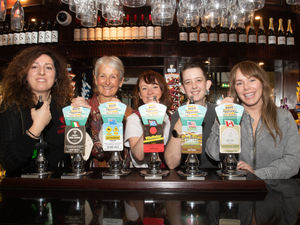We thought it would be easy...it wasn’t: West Midlands Arnhem veterans recall brutal horrors of conflict
‘It’s important people remember and try to understand what it was like. Although you can’t portray what happened fully – it’s difficult to describe’.
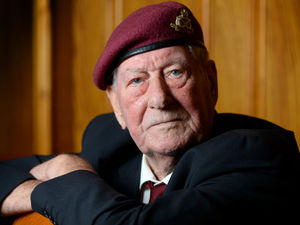
Those are the words of a Second World War hero who fought at the ill-fated Battle of Arnhem.
Tom Brewin, a private serving with the 2nd South Staffordshire Regiment, and his friend Jack Baker, a former Lance Corporal with the 1st Parachute Regiment, are among the few remaining survivors of Operation Market Garden in September 1944.
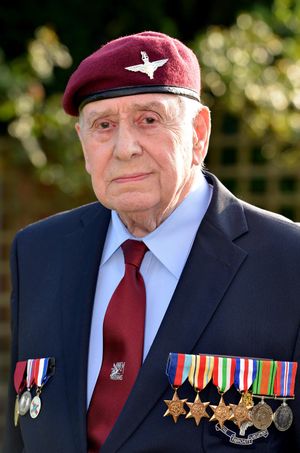
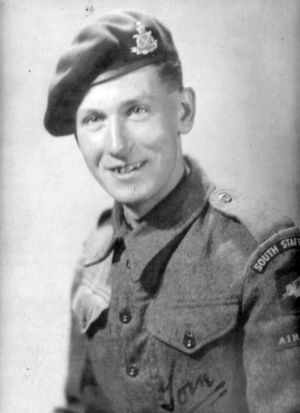
On paper, it sounded simple.
Paratroopers and glider-based soldiers would be dropped in Arnhem, which was on the other side of the Rhine to other Allied forces, then take control of the bridges.
This would pave the way for armoured units to progress towards Germany’s industrial heartlands.
But in reality things unfolded quite differently. Mr Brewin, now 92, who lives in Penn, said: “Everybody was looking forward to it – we were keen as mustard.
“We had seen so many operations cancelled and had kept having to stand down. We were pleased to finally be on the move.”
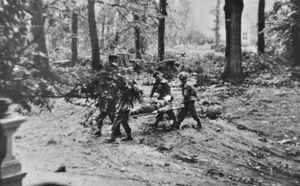
They set off from Britain on a glorious Sunday afternoon – September 17, 1944.
Seventy-three years later, Mr Brewin and other Arnhem survivors met up to mark the anniversary – on a similarly glorious day.
Mr Brewin, originally from Whitmore Reans, remembered the landing as ‘peaceful’, saying: “There was nobody about at all.” But the shared optimism of the Allied troops was soon to hit a snag.
He said: “I think we caught the Jerries unaware so there was no opposition at first.
“We consolidated our landing zone until the next morning. Then the next day we were told to make our way to the bridge as fast as we could – but we didn’t get very far.”
They soon ran into powerful German armoured troops – who covered every one of the British moves.
Mr Brewin admitted: “Wherever we tried we were met with resistance – they were very good. We caught them completely unaware but within no time at all they were organised. Whichever way we turned there was someone there to oppose us.
“We thought it would be reasonably easy – but it turned out to be anything but.”
Allied intelligence had failed to pick up on the fact two armoured German divisions were resting in Arnhem – leaving Allied airborne troops out-gunned. According to Mr Brewin this was ‘totally unexpected’.
Mr Baker, from Sedgley, landed by parachute the same afternoon as Mr Brewin.
“As soon as we landed, we headed straight for the bridge,” he said. “We would go through back gardens, crawling, doing whatever it took to get there. We were in action as soon as we landed.
“We got within a quarter-of-a-mile of the bridge, but never saw the bridge because of the bend in the river.
“It was there that we hit the heavy stuff.
“They had flame throwers, tanks and heavy guns, and we just had our rifles.”
Mr Brewin’s platoon took up a position close to the ‘Old Church’ in Oosterbeek on the Wednesday – and were there until the following Monday. At that point they were ordered to evacuate and head towards the river to be taken across on boats.
However, upon arriving they discovered a flaw in the plan. There were hundreds of men waiting to be evacuated – but only one boat, which could carry 10 to 15 at a time.
The remaining troops were soon taken prisoner by the Germans and paraded around the city. Of the 10,000 men who landed at Arnhem, nearly 2,000 were killed, with 6,854 taken prisoner.
Mr Baker suffered a similar fate.
He spent much of the week holed up in a house just outside Oosterbeek, surrounded by Germans, before being forced to surrender. Mr Baker, 93, said: “If we had not surrendered the house would have been blown down on top of us,” he recalled. “My own commanding officer, Major Chris Perrin Brown, was across the road, he ended up with just seven men out of 120.”
It was only when they reached their first stop as POWs that Mr Brewin realised he had hardly eaten for the past week.
“The Germans were doling out potato soup – it was wonderful,” he said.
“It’s the best soup I’ve had in my life.
“I realised I hadn’t really had anything to eat apart from a tin of bully the previous Monday.”
Both Mr Brewin and Mr Baker spent the rest of the war in various prisoner of war camps around Germany, before being liberated around the time of VE Day.
The Wolverhampton branch of the Parachute Regimental Association meets on the first Tuesday of every month at Short Heath Royal British Legion Club. For more details call George Babb on 07958 108526.



